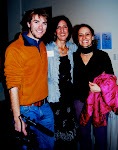Long ago, in a class with N. Scott Momaday,
after reading his Way to Rainy Mountain,
considering a blurb on the back cover that read:
“This book nags at the White man’s conscience,”
a twenty-something woman declared,
that she would not and could not feel guilty
for terrible things her ancestors had done
that she had nothing to do with, and hated.
Michelle, a seventh generation New Mexican,
fingers tacos in a booth at Tomasita’s¸ says
"It’s hard to live this way, Hispanic, Latina,
whatever you want to call me, when I do love
our traditions, when mother’s side claims pure
Spanish blood, and knowing Oñate
and the others tore through this land hell-bent
on conversion, ownership, blood on their hands.
Was there no one like me, then, against these ways?"
And Luis, on the La Luz Trail, showing me
hoary cress, wild candytuft, Alpine clover, saying
"Which part of me is Navajo grandmother,
Chicano father, White mother? Feet to femurs,
pelvis to pecs, shoulder blades to the top of my head?
Sometimes, I don’t know where each begins and end;
they rage at each other in my veins. Someday,
I am going to write a letter to each man in me,
in me, Indian, Mexican, White, who never forgets."
Shé éí Valerie yinishyé—I know there is no way
to sever the blood ties that tether me to my ancestors,
to history. They are the same umbilical that roots me
in the land. I grieve for what my Spanish ancestors
wrought as a result of ignorance, greed, want,
and the dictates of far-off governments.
And if they also brought forms of beauty
(here, on the streets of this capital city)
I remember that there are no adequate reparations.
No. I apologize. I realize my obligation to honor
the survivors and their ways as if, one snowy afternoon,
I come upon their cave dwelling, camp, village, pueblo,
a half-woman asking for food, hearth, finished limbs,
and a heart made complete by association.
VM, forthcoming in And They
Called It Horizon, Sunstone
Press, 2010


No comments:
Post a Comment